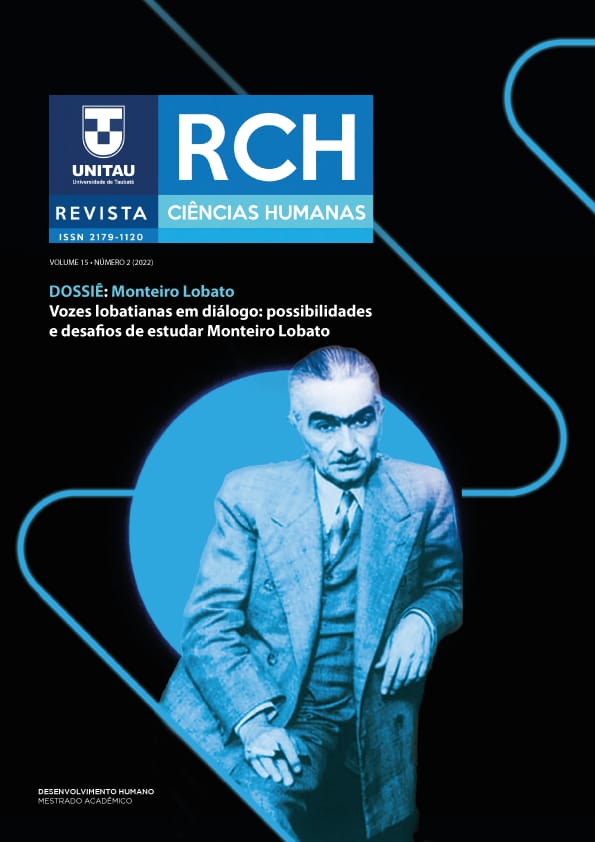LOBATO'S SOCIAL PLACE OF SPEECH AND CAIPIRA CULTURE
DOI:
https://doi.org/10.32813/2179-1120.2022.v15.n2.a893Keywords:
Monteiro Lobato, Cultura caipira, Urupês, Memória discursiva, ImaginárioAbstract
The present text has as its theme the social place of speech of Monteiro Lobato and the relations of this place of speech with the caipira culture. As guiding questions, we have: Monteiro Lobato understands the place of speech of the caipira and reflects, in his speech, this understanding? This work is justified by helping to build a reflection on Lobato's discourse that focuses on the man of the caipira culture. The objectives pursued here are: a) to identify some discourses related to caipira culture and b) to trace a route of Lobato's discourse about this culture. As a theoretical basis, there is what Candido (1978; 1987), Gomes (1980), Gouvêa (2013), among others, explains. The methodology used will be bibliographic research, of a qualitative nature. As a result, Lobato, initially, does not see the redneck man, establishing a prejudiced discourse against him, denying him the forms of economy and culture. Gradually, Lobato builds a fairer view of this culture, although her imagination has forever been marked by her initial prejudices.
Metrics
References
BOSI, Alfredo. “Cultura e culturas brasileiras”. In: Dialética da colonização. São Paulo: Companhia das Letras, 1992, p. 308-345.
BRANDÃO, Carlos Rodrigues. Os caipiras de São Paulo. São Paulo: Brasiliense, 1983.
CANDIDO, Antonio. Os parceiros do Rio Bonito. São Paulo: Duas cidades: 1987.
FRANCO, Maria Sylvia de carvalho. Homens livres na ordem escravocrata. São Paulo: Instituto de Estudos Brasileiros, 1969.
FREDERICO, Enid Yatsuda. “O caipira e os outros” In: BOSI, Alfredo (org.). Cultura brasileira – Temas e situações. São Paulo: Ática, 1987.
GOMES, Paulo Emílio Salles. Cinema: trajetória no subdesenvolvimento. Rio de Janeiro: Paz e Terra, 1980.
GOUVÊA, LUZIMAR GOULART. Monteiro Lobato e Mazzaroppi e o imaginário caipira. Taubaté: Casa cultura, 2013.
LAJOLO, Marisa. Monteiro Lobato – A modernidade do contra. São Paulo: Brasiliense, 1985.
______. “Jeca Tatu em três tempos” in SCHWARZ, Roberto (org.) Os pobres na Literatura Brasileira. São Paulo: Brasiliense, 1983.
LOBATO, Monteiro. Problema vital. São Paulo: Brasiliense, 1951.
______. Urupês. São Paulo: Brasiliense, 1992.
______. Zé Brasil. Rio de Janeiro: Editorial Vitória Régia, 1947.
MEMMI, Albert. Retrato do colonizado precedido pelo retrato do colonizador. Rio de Janeiro: Paz e Terra, 1977.
NAXARA, Márcia Regina Capelari. Estrangeiro em sua própria terra – representações do trabalhador nacional – 1870 a 1920. Dissertação de mestrado – Departamento de história, Instituto de Filosofia e Ciências Humanas – Unicamp, 1991.
RIBEIRO, Darcy. O povo brasileiro. São Paulo: Companhia das Letras, 1995.
SKIDMORE, Thomas S. Black into white – Race and nationality in brazilian tought (trad. de Antonio Alves de Lima Neto). New York: Oxford University Press, 1974.
Downloads
Published
How to Cite
Issue
Section
License
Copyright (c) 2022 Human Sciences Journal - RCH

This work is licensed under a Creative Commons Attribution 4.0 International License.
The publications of the Human Sciences Journal are registered under the Creative Commons Attribution CC-BY license.
1. The contents of the manuscripts are the exclusive responsibility of their author.
2. It is allowed the total or partial reproduction of manuscripts published in the journal, provided that the source is cited.
3. When submitting their manuscript to the Journal, the authors certify that they are of their own authorship and unpublished (not published in any digital or printed media).
4. The copyright of the articles published in the Journal are of the author, with first publication rights reserved for this journal.
5. For disclosure purposes, the Journal may replicate the works published in this journal in other media, such as social networks (Facebook, Academia.Edu, etc.).
6. The Journal is of public access, therefore, the authors who submit manuscripts agree that they are of free use.
7. In case of any illegality, fraud, or other attitude that puts in doubt the honesty of the publication, especially the practice of plagiarism, the manuscript will be automatically rejected.
8. If the manuscript has already been published, it will be immediately removed from the base of the Journal, its citation linked to the Journal will be prohibited and the cancellation of the referred publication shall be reported in the next issue of the one in which the article was published. In case of the procedure for the withdrawal of the paper the authors will be informed beforehand, being guaranteed the right to a broad defense.
9. The personal data provided by the authors will be used exclusively for the services provided by this publication and will not be made available for other purposes or to third parties.





